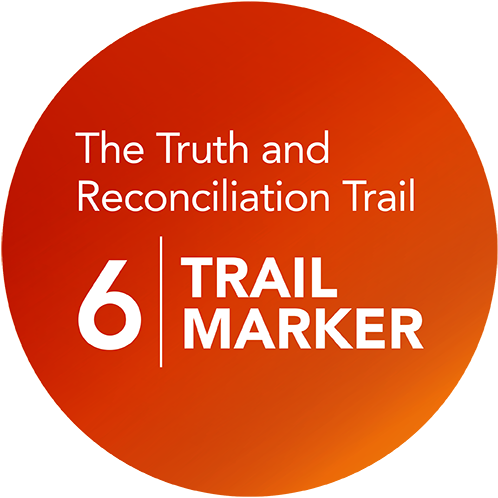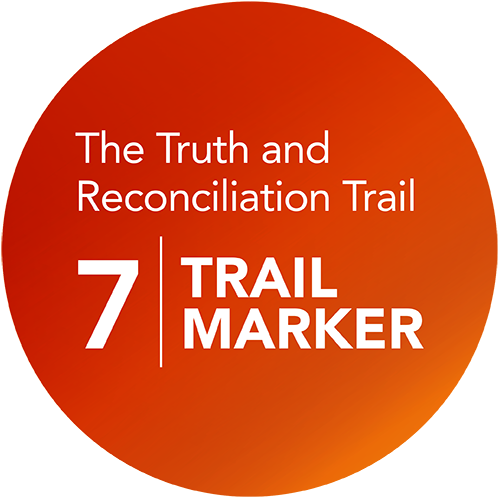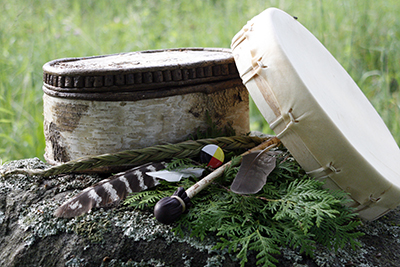The Truth and Reconciliation Commission of Canada
Truth and Reconciliation Trail | Marker 6
Despite the Canadian government’s attempt at assimilation; Indigenous People are still here. In fact, Residential School Survivors brought the topic of residential schools to the public’s agenda. Alongside the largest class action lawsuit against the Canadian government at the time, the Truth and Reconciliation Commission of Canada (TRC) was formed. The TRC’s mandate was to promote awareness to Canadians about the Indian Residential School system and provide an opportunity for those affected by residential schools to courageously share their stories. By honouring their Truths, we can begin to Reconcile for a better future.
History of the Truth and Reconciliation Commission of Canada
In May 2006, the Indian Residential School Settlement Agreement occurred. It was the largest settlement in Canadian history. Residential school survivors were part of a class action lawsuit against the Canadian government and were able to receive financial compensation for their experiences in residential school.
Here we had Indigenous People who put the issue of residential schools on the public agenda. Alongside the class action lawsuit was the formation of the Truth and Reconciliation Commission of Canada. Led by the Honourable Justice Murray Sinclair, Chief Wilton Littlechild and Dr. Marie Wilson, this Commission was created to provide an opportunity for those affected by residential schools to courageously share their stories. From these stories, a multi-volume report was created along with 94 Calls to Action.
The TRC defined “Reconciliation” as the following:
“Reconciliation is about establishing and maintaining a mutually respectful relationship between [Indigenous] and Non-[Indigenous] peoples in this country. In order for that to happen, there has to be awareness of the past, acknowledgement of the harm that has been inflicted, atonement for the causes, and action to change behaviour. (2015, p. 6)”
The 94 Calls to Action are legal imperatives to address the legacy of residential schools and ensure reconciliation between Canadians and Indigenous People. Residential School Survivors wanted to see a fundamental change in the relationship between themselves and the rest of Canada. All Canadians are called upon to engage in reconciliation, including post-secondary institutions.
Call to Action 62 calls upon “post-secondary institutions to educate teachers on how to integrate Indigenous knowledge and teaching methods” (2015, p. 238). At Georgian College, the Debwewin miinwaa Naaskodaadiwin Miikaans is a living response by the Georgian College community to Truth and Reconciliation.
The National Centre for Truth and Reconciliation is currently in Manitoba and is an archival repository for all of the material collected by the Truth and Reconciliation Commission of Canada. By honouring the Truths of Survivors, we can begin to Reconcile for a better future for all.

Gathering truth
Reconcili-ACTION
Scan the Truth and Reconciliation Commission of Canada’s 94 Calls to Action. Choose ONE call that speaks to you personally and/or professionally. You can choose a Call that is catered to your present or future field, or perhaps it is a Call that speaks to your heart. After you chose your Call to Action, reflect on the following:
- How would you summarize this Call to Action in your own words?
- Why is this Call to Action important?
- What’s being done to address this Call to Action nationally, provincially, and locally (if anything)?
- What actions are you already taking (or would you need to start taking) to action this Call?
Continue your journey through the trail markers
Trail marker 7 | Reconciling for the future
All Canadians have been called upon to be a part of Reconciliation. Acts of Reconciliation should center Indigenous self-determination, empower Indigenous People, and establish respectful relationships between Indigenous and non-Indigenous people. There’s many ways you can meaningfully engage in Reconciliation as outlined by the Truth and Reconciliation Commission of Canada and its 94 Calls to Action. There are Calls to Action that speak to all levels of government and all sectors of society, including education. You are encouraged to find and commit to one that speaks to you.

